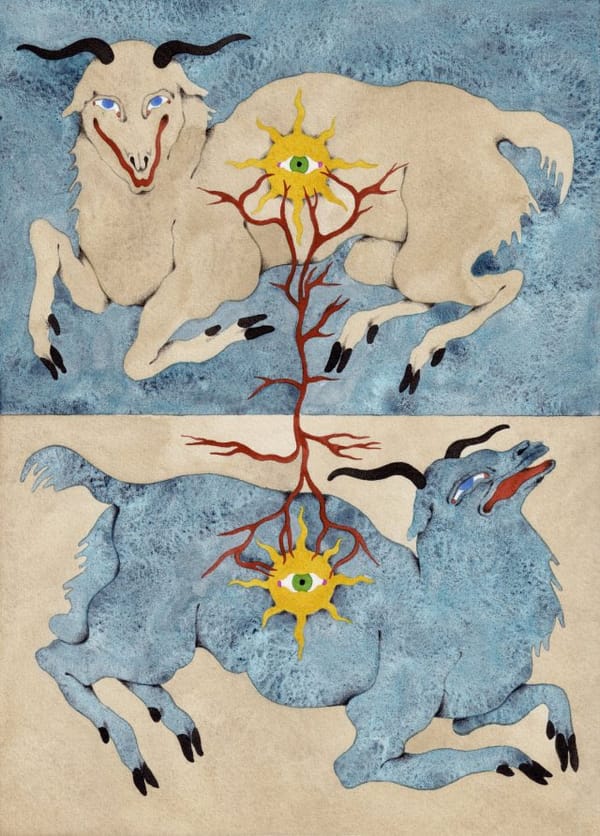Comfort, joy, and the 'woke mind virus'
Inspecting the changes happening in many people's relationships with comfort and joy inevitably reveals systemic problems


I.
Comfort and joy make sense together. You arguably feel some of both any time you enjoy something.
There’s a reason for that Christmas carol naming them separately, though. They can be at odds. One can be proactively sacrificed for the other, or come at the cost of the other.
I understand there's a guy inside me who wants to lay in bed, smoke weed all day, and watch cartoons and old movies. My whole life is a series of stratagems to avoid, and outwit, that guy.
— Anthony Bourdain
Citizen Kane is really about accumulation, and at the end of the accumulation you see what happens, and it’s not necessarily all positive. The table getting larger and larger, with he and his wife getting further and further apart as he got wealthier and wealthier…perhaps I can understand that.
— Donald Trump
It’s not just possible for comfort and joy to be at odds. They can be separable. You can feel joyful in squalid, painful conditions. You can feel empty and miserable in pleasurable and comfortable ones. For this reason, there lies, beyond these scenarios of aligning and competing, a secret third thing.
II.
The third thing happens when we forget the original one entirely because we focus too hard on the second; we try too hard to trade them, too hard to maximize one or the other. In our ill-fated trade we sacrifice both. We make what we think is a fair exchange of comfort for joy or vice versa, and end up with less comfort and less joy on the balance sheet than forecasted.

@realonesjonbernthalA little Bernthal close read of a classic Russian play never hurt nobody #jonbernthal #moscow #theseagull #chekhov #chekhovsgun

Tiktok failed to load.
Enable 3rd party cookies or use another browser
We shoot the seagull when we don’t have to. We do it when not doing so is the way to maximize comfort and joy.
We too often realize it only after we find ourselves standing over a dream we’ve conquered, holding nothing but a dead seagull for our efforts.
And last but not least, we too often keep doing it anyway — taking the cynical Trumpian bargain, the morbid comfort of a dead seagull’s weight in our arms rather than any shared or less-controllable joy or dream — because we’ve been conditioned to. Because it’s the comfortable life we know.
These are all very American tendencies. In America especially, we hold each other hostage in this way, giving each other Stockholm Syndrome, basking in the thrall of a great game show where the correct response is always, as a first resort, to shoot the seagull.
III.
A couple weeks ago, the Washington Post published an article about America’s epidemic of loneliness. Their expert analysis: millions of people happen to be making the same antisocial choices at the same time. Luckily the best way to surface the truth on the Internet is to be wrong. In this way, the truth surfaced.
The Washington Post piece ends with a hollow plea for readers to “Go hang out with friends for coffee, or a hike, or in a museum, or a concert — whatever,” the writer says. “You will feel better, create memories, boost your health, stumble across valuable information — and so will your companions.” The writer says people must “put effort into building relationships.”
Well, yeah, dude. You think these ideas haven’t occurred to any of the people spending unhealthy amounts of their time alone? If “reversing” this mass loneliness was as easy as going on a hike with your neighbor or calling a friend to get coffee, then this wouldn’t really be a problem in the first place. All of this goes much deeper than phoning a friend for coffee.
— Zachary Siegel, Why are Americans so Alone?
Writing about how loneliness affects teens specifically, P.E. Moskovitz names a few obvious culprits among many. “The increasing usage of the internet as a replacement for real-life relationships, the over-burdening of everyone, including teens, with work and school, the pandemic (though this trend started long before the pandemic).”
IV.
This phenomenon does, to be fair, involve people making personal choices. We do in fact seem less willing to show up for each other. Nastier in public venues. We seem to see less of the dire, personal, human impacts that our bad choices and bad government policies have on each other. We’re comfortable in our online bubbles.
But Siegel and Moskovitz both reveal, easily and beyond a reasonable doubt, connections between loneliness and wider systemic issues quite literally making us make these choice more often, making us worse at them, making them make sense to us.
There is a noticeable lack, they convincingly argue, of collective purpose — unions, social causes, that kind of thing — compared to earlier eras, and a mass complacency as a result. Words besides “loneliness” are more apt for this reason. Disenfranchisement, deprivation, disengagement.
V.
This is not just coming from a bird’s eye view. This is clear from the fact that there are people who have done exactly what the Post recommends and then some — people who by the sweat of their brows have fixed their broken brains and rebuilt social lives, powering through awkward moments — and invariably encountered what the tweet below points out.
You end up encountering a final final boss after the final boss. At the end of the tunnel there’s a little more tunnel. After you work on your mental health or make friends or do whatever it is you personally need to do, there are things to fix. There are things that systemically threaten to drain our individual comfort and joy.
This extra work, this ultimate boss, represents the extra weight that poorly- and cruelly-designed systems add. The book The Mythical Man Month by Fred Brooks shows the point in a dry way. When you put 5x as many engineers on a project, it doesn’t speed up the project by 5x. There’s extra communication that needs to happen to get everyone up to speed. Decisions that need to be documented. These things add friction. There’s no free lunch. You don’t get something for nothing. Reality is messy and nonlinear.
VI.
And so we see: the way it is with loneliness — no clean, clear, input-output relationship between individual, hermit-like comfort and interpersonal joy — is the way it is with many other things. You wouldn’t remove water from a sinking boat with a thimble. Individual efforts, with too few pointed in the same direction, can and do miss things that actively sap our collective comfort and joy from afar. More is needed. We need people to direct individual efforts in a direction that many people voluntarily agree on, for the greater good.
The people closed off to this — to hearing anything about “systemic issues” and “collective action” — do not seem to appreciate what the flip side implies. If it’s more of a systemic and therefore mechanistic problem than we realize, then we can do things about it! It has knowable inputs, that make it steadily get worse, but could make it steadily get better! We can change those inputs! People like Musk and Trump could have realized this and been heroes.
A better explanation, then, may be that they do realize this and choose not to go there. They choose to continue in their comfort zones, even as their publications tell us to get out of ours.
VII.
It seems they actually know why young people lean “woke.” Trump, in the quotation I showed earlier, clearly shows an understanding of this. They know full well that systemic injustices exist, and they “deny deny deny,” and refuse to listen, and play dumb, because they know that the process of fixing these things will take them out of their empty and directionless comfort zones. It will deprive them of many things — beloved assault rifles, SUV-oriented public infrastructure, criticisms of trans people. They’re simply not ready. They don’t want to help us fix the boat or build a new one, and they don’t want to get out of the way. They want to stand there and throw a tantrum.
Out of whatever combination of being duped and being cynically comfort-clinging, these people latch onto the absolute wrong things about prior generations that gave people, in some cases, more comfort and more joyful, social, fulfilling lives. They think people who came of age from 1960 to 1990 got a decent shake at starting off good, prosperous lives because women and minorities “knew their place” and people weren’t so “woke.”
Once you know that’s factually incorrect, that’s it. Many younger people — Siegel and Moskovitz and myself and many others — are incapable of suffering this foolishness because our minds won’t let us. We know too many facts that suggest otherwise, and when considered together, paint an obvious story. Our minds, now expanded, cannot regain their original dimensions.
VIII.
There is simply too much joy and comfort from that era that too obviously came from a safety net, and one built on the backs of women and minorities, not in spite of them “being uppity.” Too much productivity came from publicly defeating the Nazis and publicly paying into scientific research. The Internet, satellites. Too many benefits of having a spirit of inclusion and cooperation have rippled too far outward for too long.
The clown takes of these people are too transparent. Taryn Fenske, counsel for Ron DeSantis, recently defined being “woke” as “a general belief in systemic injustices in the country.” Oh word. Seems we’re in agreement.
Such injustices are impossible not to see unless you heavily delude yourself. These injustices exist as things you can absolutely detect, like greenhouse gas particles and COVID, but things that, once “out there,” you can’t trace to a specific emitter. They result, in the modern day, as a great and gnarled tree of things. One small branch or bough: imagine COVID complications that your insurance company will never compensate you for, because you can’t trace it back to your job giving you COVID, because no one tries to stop it anymore. In the end, of course, the entire responsibility for dealing with it falls squarely in the lap of you, the individual — on millions of atomized families and individuals — and harder on some than others.
IX.
Obviously, unless we ourselves change things, it will continue to go this way for the rest of our lives. This is why people in my generation and younger roll our eyes and boo at those who make “anti-woke” their whole platform. Those things causing leaks in our boat that we can’t fix one thimble at a time? They’re actually really obvious.
They’re too clearly and directly related to systematic thefts of comfort and joy that are easy to see. They have existed historically and exist currently. I’m not saying this to make anyone feel bad. I’m saying it because it’s true. It’s loathsome to many; it’s flatly contrary to fantasies where all of a person’s comfort and joy have been secured by them and them alone. Don’t coddle those people; their fantasies are built up with centuries of collective scars inflicted upon others.
We see the moral of those scars. We see the hollowness, and the lack of common sense, in continuing to put comfort and joy purely at odds with each other, like a kid with G.I. Joes reflexively and unthinkingly bashing them into each other. We see the emptiness of spending all of one’s time trading them back and forth, doling out the decreasing winnings to an undeserving few.
X.
We see — rather, we need, as a matter of survival — an alternative. We acknowledge common sense: the companionship of comfort and joy, the times when they’re at odds, and the separability of the two. We see the need to maximize both, and extend both to others, so that it might come back to us. We see that this is the way to stop the endless cycle of cutting up a diminishing pie and “make the pie higher,” as Bush Jr. so eloquently put it. To raise all boats. To make our cups runneth over.
Because we see this, we ask ourselves things. We ask how much of the declining comfort and joy is just our choices, versus mental illness, versus the Internet, versus bad government policy, versus capitalism and robber barons driving people apart while angling our heads down toward work. These are not mere blame game questions, not ways of giving ourselves a stage to “virtue signal,” but parts of the real and urgent process of realizing things are messed up, and figuring out how to do something effective.
I’m not saying “woke” or “progressive” people are holy or blameless here. None of us are. What I’m saying is that I have more questions for the people letting themselves fly into a Pavlovian rage when people say “Happy Holidays” over “Merry Christmas.” I have fewer questions for the people who can be normal about it, and who can say one or the other, and who can wish each other tidings of comfort and joy, and who can go on their merry way.




